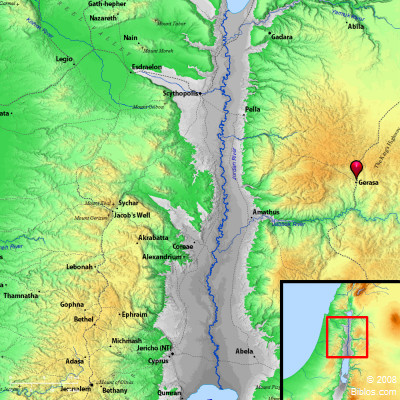"They came to the other side of the sea, to the country of the Gerasenes. And when Jesus had stepped out of the boat, immediately there met Him out of the tombs a man with an unclean spirit. He lived among the tombs. And no one could bind him anymore, not even with a chain, for
he had often been bound with shackles and chains, but he wrenched the
chains apart, and he broke the shackles in pieces. No one had the
strength to subdue him. Night and day among the tombs and on the mountains he was always crying out and cutting himself with stones. And when he saw Jesus from afar, he ran and fell down before Him. And
crying out with a loud voice, he said, 'What have You to do with me,
Jesus, Son of the Most High God? I adjure You by God, do not torment
me.' For He was saying to him, 'Come out of the man, you unclean spirit!' And Jesus asked him, 'What is your name?' He replied, 'My name is Legion, for we are many.'"
- Mark 5:1-9
When I interact with anti-Trinitarians, whether of the Arian or Sabellian varieties, one strategy they all seem to try is to describe the Trinity in this way: "One plus one plus one equals three, so you believe in three gods." For some inconceivable reason, they think this is a very clever argument, even though math has nothing to do with it. Or, if you want to do math, why can't it be one times one times one equals one? Or one cubed is one? If you see what I mean, the argument is nowhere nearly as clever as they think it is. We talk about things as unities in one sense but manifold in a different sense all of the time. Have you heard of the three branches of the one federal government?
Yet, the anti-Trinitarian desperately holds on to this argument. Their answer is, "Well, we do that, but the Bible doesn't."
Really? I guess anti-Trinitarians don't read Mark 5. Notice the interaction between Jesus and the demoniac. Actually the demon in the demoniac. Notice that Mark refers to the demon consistently as "he," not "they." And notice that the demons say "me," not "we," except one time in verse 9. Even in verse 9, the demon says "my name is," not "our names are."
My point is that the Bible certainly does refer to things as one in one sense and manifold in another. In this case, we see one demon also described as a legion, a unit of Roman military consisting of about 6,000 soldiers. If the demon of Mark 5 can be 6,000 demons described as a unity, then why can't the three Persons of the Trinity be one God?
SOVEREIGN GRACE
1 day ago





1 comment:
This reminds me of the Athanasian Creed. In it each person of the trinity is described with divine attributes yet there are not three gods but one God
“The Father uncreated, the Son uncreated, and the Holy Spirit uncreated.
The Father incomprehensible, the Son incomprehensible, and the Holy Spirit incomprehensible.
The Father eternal, the Son eternal, and the Holy Spirit eternal.
And yet they are not three eternals, but one eternal.
As also there are not three uncreated nor three incomprehensibles, but one uncreated and one incomprehensible.
So likewise the Father is almighty, the Son almighty, and the Holy Spirit almighty;
And yet they are not three almighties, but one almighty.
So the Father is God, the Son is God, and the Holy Spirit is God;
And yet they are not three Gods, but one God.
So likewise the Father is Lord, the Son Lord, and the Holy Spirit Lord;
And yet they are not three Lords, but one Lord.”- Athanasian Creed
Post a Comment